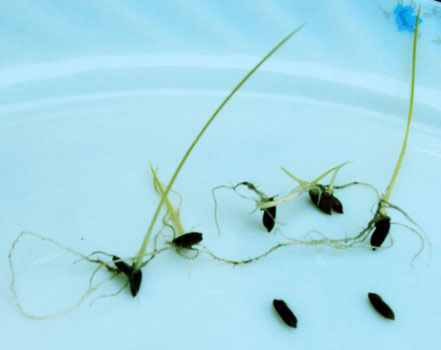Recently, the phenomenon of a rice grain believed to be 3000 years old germinating has been one of the focuses of attention of the press, scientists and public opinion.The units that discovered and excavated these rice grains were the University of Social Sciences and Humanities and the Hanoi Museum. The location of the discovery was Thanh Den (Tu Lap Commune, Me Linh District, Hanoi) - a famous archaeological site, considered the largest metallurgical and bronze casting center in our country during the Pre-Dong Son period.

In an interview with the press, Associate Professor Dr. Lam Thi My Dung - Director of the Museum of Anthropology, University of Social Sciences and Humanities - who is also directly in charge of the excavation, said: Burnt rice and paddy grains were discovered in kitchen trash pits in Thanh Den, at a depth of 1 m below the ground. When soaked in water for about 2 days, 10 rice grains sprouted and sprouted leaves. Associate Professor Dr. Lam Thi My Dung also provided many bases and evidences to argue and affirm that the newly sprouted rice grains were 3000 years old and belonged to the Dong Dau culture. Immediately after discovering the phenomenon of excavated rice grains germinating, Associate Professor Dr. Lam Thi My Dung and her colleagues reviewed the scene, observed directly, re-examined video tapes and excavation photos to eliminate all possibilities that these rice grains came from a modern civilization, which had coincidentally appeared at the excavation site. The germination of rice seeds dating back 3,000 years has caused surprise and skepticism among scientists. Mr. Nguyen Van Bo - Director of the Institute of Agricultural Sciences told the press: "In principle, it is very difficult for rice seeds from 3,000 years ago to still germinate. However, we do not rule out this possibility because it is very possible that those rice seeds were preserved in a special environment that humans do not know about." Many leading experts in archaeology and agriculture have come to the site to observe the scene and the excavated rice seeds. Professor Dao The Tuan - a leading professor in agriculture commented: These seeds are short in shape, wide in width, not long and slender like tropical rice, this is also the shape of the oldest rice varieties in Vietnam such as upland rice and sticky rice. Mr. Nguyen Lan Cuong - Deputy General Secretary of the Vietnam Archaeological Association said: "... I am completely convinced that the germination date of the rice seeds is 3,000 years ago". However, why rice seeds lying underground for 3000 years can germinate, scientists can only hypothesize that there is a special condition that creates an absolutely anaerobic environment for the rice seed storage area at Thanh Den site, thereby maintaining their vitality. Currently, 8 germinated rice seeds have been brought to the Institute of Agricultural Genetics for cultivation, care and research. But experts also say: it is necessary to grow rice, separate leaves, decode the gene and then compare it with the genome of current rice plants to be able to make a final conclusion about whether this is an ancient rice variety or not. And this is a rather complicated job, difficult to do in Vietnam. However, speaking to the press, the Minister of Agriculture and Rural Development said: In case of real necessity and scientists have a request, no matter how expensive it is, the Ministry will coordinate with relevant ministries and branches to implement it. Although there is no final conclusion, this is considered an extremely important and unique discovery of archaeology. Scientists are facing the possibility of finding the genome of a 3000-year-old ancient rice variety, providing valuable information about the rice civilization of our ancestors. Director of the Agricultural Genetics Institute Le Duy Ham said that if this is indeed an ancient rice variety, this will be an unprecedented discovery, with great significance in terms of history as well as genetics.

